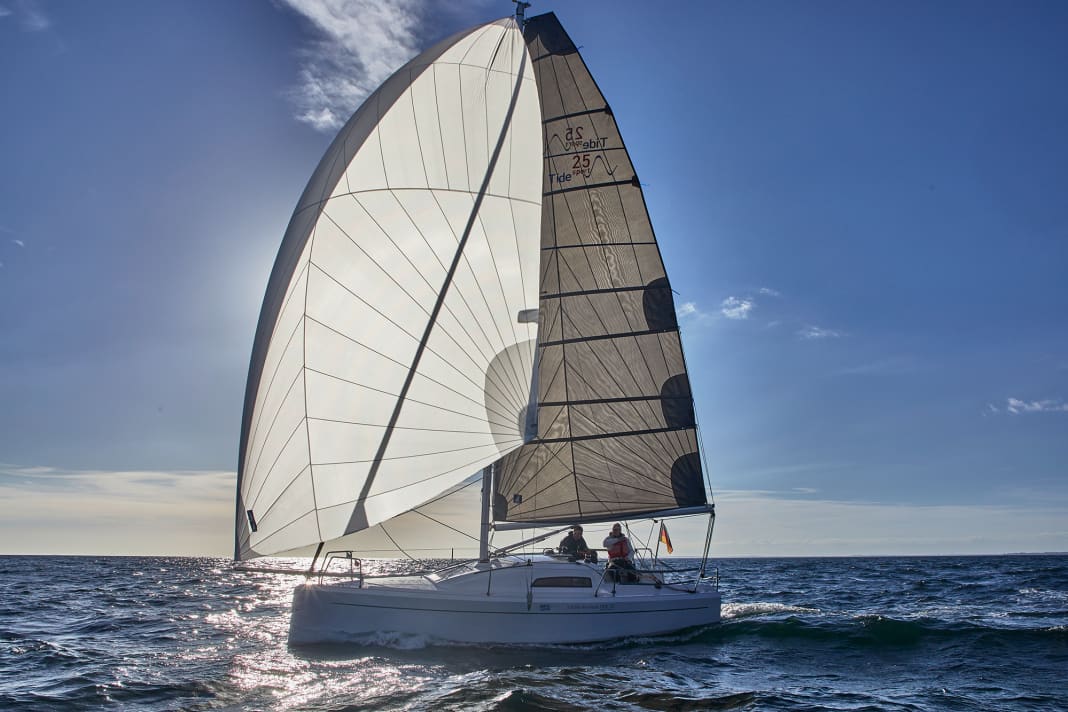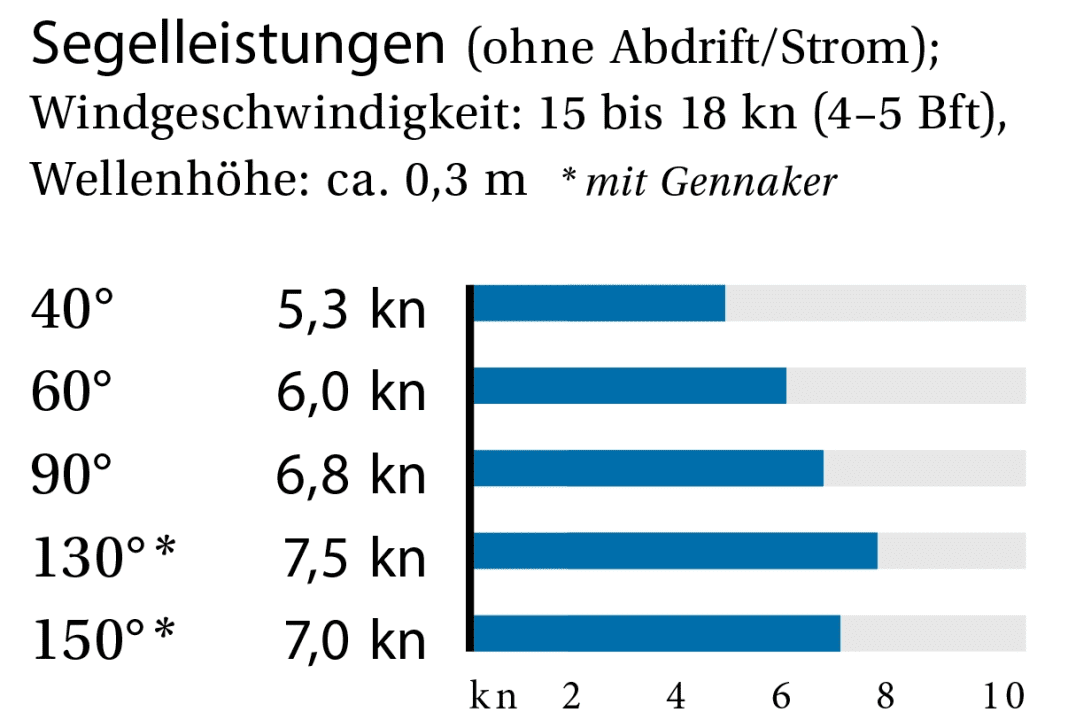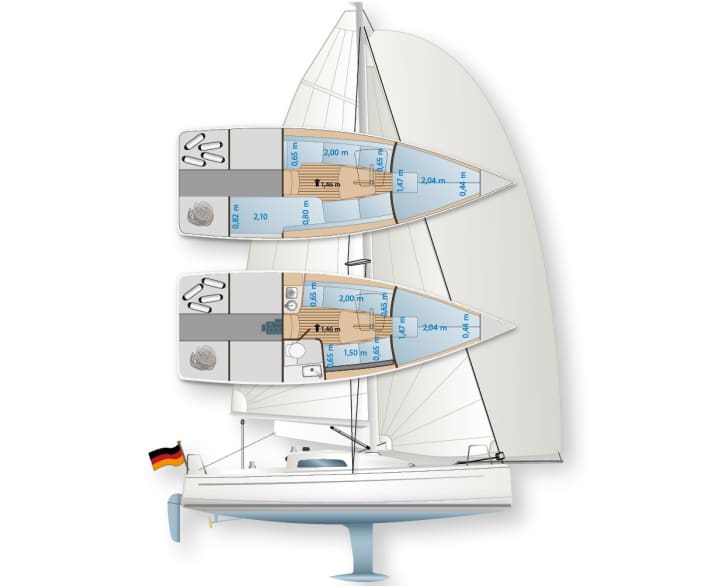





The compact cruiser scene has been enriched by a new old model. The Tide 25 was launched back in 2014 with the manufacturer SQ Yachts, which was founded by former Dehler employees after the shipyard was sold to Hanseyachts and relocated to Greifswald. The name SQ, in turn, was intended to remind us of some Dehler models that were labelled with the abbreviation that stood for Speed & Quality - which, confusingly, is now used by Dehler again. With the SQ 25 and commissioned work for Comfortina, SQ Yachts endeavoured to make a new start at the traditional site in Freienohl in the Sauerland region, where Germany's largest and Europe's most innovative shipyard once built yachts with great success.
Insolvency after dreams
It went wrong. The young company had to file for insolvency back in October. Too few boats sold, too few external orders. The mast breakage of the SQ 25 during the YACHT test is unlikely to have helped the development of the brand either.
A pity, because the SQ 25, designed by Marc-Oliver von Ahlen as a "30-footer that was washed too hot" (von Ahlen), as a large boat in a small format, proved to be a well-sailing, cleanly built, independent and versatile, beautiful specimen that would have deserved its place in the market.
But now salvation is in sight. The East Frisia-based shipyard Maritime Faserverbundtechnik Haring has taken over the moulds and rights and is now building the ship as the Tide 25. The manufacturer already produces the highly acclaimed Tide 36 in addition to high-class specified components for megayachts, submarines and wind turbines.
A new start with the Tide 25
But can a design from 2014 still be contemporary or at least timeless almost a decade later? It can: with dynamic bevels and edges, a vertical stem, continuous chines, short underwater profiles and the option of an open stern and double rudder blades, the Tide 25 is still an attractive and modern compact cruiser both visually and in terms of design, which the designer sees more as a "weekender than a sports boat".
In other words: basic comfort meets superior sailing performance. The boat retained another special feature during the transition from the SQ to the Tide: the great variance, which is unrivalled in this size. Open or closed stern, traveller aft or just a foot block in the centre of the cockpit, dents of the same height throughout or flat aft cockpit boxes are available.
The Tide 25 is extremely variable
Things really take off under water: A central or double rudder, two fixed keels for draughts of 1.10 and 1.60 metres and even a swing keel version with a variable draught of 0.75 to 1.80 metres are possible. And for the backstayless rig with the strongly swept spreaders, mainsails of various dimensions as well as a self-tacking jib or a genoa can be selected, which is also sheeted on the roof and with the halyard winches.
The wealth of variants continues below deck. The basic version is equipped with four berths. A toilet room, galley and electric cool box can be added or retrofitted. And for propulsion, a petrol or electric outboard engine, built-in diesel, built-in electric motor or even double e-pods like on the test boat are possible.
Comfort or camping?
Regardless of the version, the visible finish of the plastic, fittings and installations is upmarket and the overall impression is one of quality. However, the space available in the interior is quite limited. There are no cupboards, only open shelves and space under the bunks.
The forward cabin is 2.04 metres long and just under 1.50 metres wide, and the other berths also have comfortable dimensions. However, there is no headroom. The interior height is 1.46 metres. Marc-Oliver von Ahlen: "We deliberately did not try to offer a yacht with headroom and maximised volume. In comparison, the Weekender offers more elegant lines, better sailing characteristics and performance as well as easy towing thanks to its lower weight."
The Tide 25 has impressive sailing qualities
The strengths of the SQ 25 therefore lie in its sailing qualities. In winds of up to 18 knots, the ship proves to be stiff and can take a lot of position, which is also thanks to the externally mounted double-blade system, which works smoothly and with little play. The optional wide traveller at the stern makes it easy to parry gusts.
The arrangement of the headsheets on the coachroof - in addition to the self-tacking jib, the conventional genoa for narrow sheet angles is also run with rails on the roof - makes it difficult for the helmsman to operate them. The tacking angles, i.e. the height upwind, are good, as are the speeds. Double-digit values can be achieved under gennaker, whereby the boat is also controlled on these courses.



The price of the Tide 25 is upmarket. 77,350 euros for a seven-and-a-half metre boat is a confident statement - but one that is likely to be accepted on the market.

Technical data
- CE design category C
- Hull length 7.50 m
- Waterline length 6.74 m
- Width 2.49 m
- Draught/alternative 1.10/1.60 m
- Swivelling keel 0.75-1.80 m
- Mast height above WL 11.40 m
- Weight 1.9 tonnes
- Ballast/proportion 0.6 t/32 %
- Mainsail (Std.) 20.0 m²
- Jib (Std.) 15.0 m²
- SW jib (Std.) 12.9 m²
- Sail area downwind (hours) 35.0 m²
- Sailplane upwind (sport) 40.6 m²
- Theoretical hull speed 6.0 knots
- Machine optional
Hull and deck construction
Sandwich with foam core and vinyl ester in the first laminate layer. Composite keel with lead bomb
Sailing plan
Fathead mainsail, backstayless rig. Optional self-tacking jib and bowsprit that can be extended on deck also stand for speed and efficiency in operation
Modules
Drives, swivelling keel, wet cell, galley, double or central rudder, open or closed stern: no other ship of this size is so variably configurable
Drives
Outboard, built-in diesel, e-drive or double e-pods: not even larger boats offer so many options
Equipment and prices
Base price ex shipyard € 77,350
Price ready to sail galley, toilet module and engine are not yet calculated
Guarantee/against osmosis
2/5 years
Shipyard and distribution
Maritime Fibre Composite Technology, Haring, Zum Zungenkai 4a, 26725 Emden; Tel.: 04921/93 69 300; www.mfh-emden.de
YACHT rating
Fast, agile, sophisticated, can be equipped with a swivelling keel, extension options and other modules, and is also attractive: the Tide 25 is an asset to the compact cruiser market
Design and concept
- + Proven design
- + Modern sail plan
- + Various options
- - Comparatively expensive
Sailing performance and trim
- + High speed potential
- + Stiff and controllable
- + Highly functional deck layout
Living and finishing quality
- + Clean finish
- - Little storage space inside
Equipment and technology
- + High-quality components
- + E-drive selectable
- + Swivelling keel option

